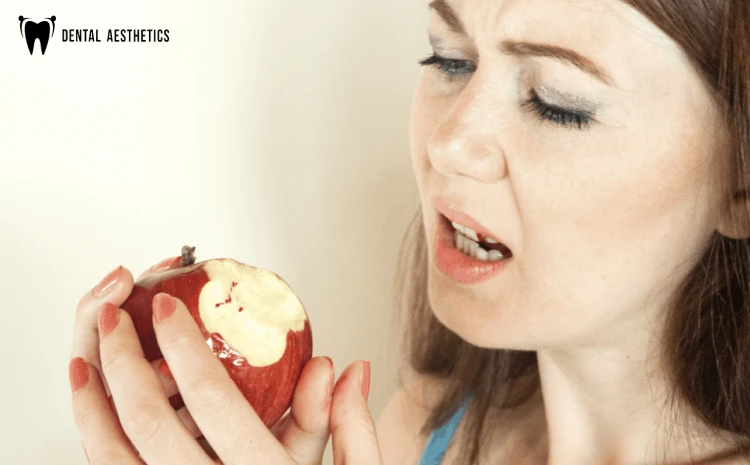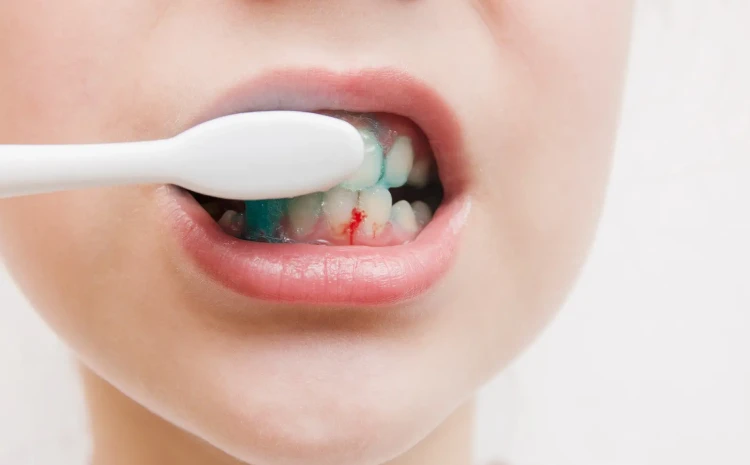Gum Bleeding:Reasons and Treatments I Dental Aesthetics

July 9, 2024
Bleeding gums are a typical sign of gingivitis, periodontitis, and other gum diseases and are caused by dental plaque accumulation.
However, bleeding from your gums may also be a symptom of other health problems, such as stress, blood-clotting disorders, vitamin deficiencies, and hormone swings.
Let's take a dive to understand reasons why gums bleed and its treatment.
Reasons Behind Bleeding Gums
Are you prone to gum bleeding? Gum bleeding can be caused by a variety of factors, from improper brushing technique to more serious conditions like gum disease. It could be the result of anything as basic as brushing or flossing incorrectly. Plaque accumulation at the gum line is the primary cause of bleeding gums. This will result in inflammatory gums, or gingivitis.
Alternatively, it can indicate a medical issue that needs to be investigated. Gum bleeding is not inherently dangerous; nevertheless, the underlying cause of this symptom may be. The following is a list of some potential reasons why gums may bleed.

Using too much force when brushing:
You may be inclined to brush your teeth as hard as you can in an attempt to maintain their cleanliness. However, because gums are composed of delicate tissue, improper brushing could cause damage to them.
Whether you go with an electric or manual toothbrush, be sure it has blunted edges and soft nylon bristles. Despite the fact that brushes with medium or hard bristles are available, using them could erode your teeth's enamel or result in inflamed, red gums.
When brushing, be sure to massage and thoroughly clean the teeth and gums with soft, circular strokes. Though many people do so, moving back and forth can aggravate and harm your gums, causing them to become irritated and more prone to bleeding or receding. Brushing properly you can avoid having any treatment for bleeding gums.
Having improperly fitted dentures:
If your dentures rub against your gums and create ulcers, they may cause bleeding gums. Individuals who neglect to remove their dentures at night may be more vulnerable to bleeding gums. Furthermore, it's crucial to brush your teeth and thoroughly clean your dentures if you wear dentures in order to avoid plaque accumulation and gum inflammation.
Pregnancy:
The gums of almost half of pregnant women swell, become red, become painful, and bleed when they brush or floss. This occurs because the body's reaction to the bacteria that causes gum disease is altered by hormonal changes that occur during pregnancy. During your pregnancy, take good care of your gums and teeth by brushing twice a day with fluoride toothpaste and flossing once a day.
Unhealthy eating habits:
Processed food has some components that might irritate and bleed gums. Steer clear of processed and sugary foods in favor of a well-balanced diet full of fruits, vegetables, and foods high in calcium, magnesium, vitamins A, K, and C.
Health issues:
Patients with specific medical conditions, such as liver illness, blood coagulation abnormalities, anemia, leukemia, and temporal arteritis, are more likely to experience gum bleeding.
Also read about:
5 Reasons Dental Health Is Important to Prioritize

Methods for Treating Bleeding Gums
Here are some of the tips that you can follow to treat your bleeding gums.
Maintain proper dental hygiene:
Taking care of your teeth properly is the first step in treating bleeding gums. The accumulation of plaque along the gum line causes the gums to bleed and become irritated. Your teeth and gums are covered in a sticky film called plaque that is made up of germs. Additionally, the germs can spread and result in gum disease or tooth decay if you don't brush or floss frequently enough. Brush your teeth at least twice a day and floss once a day to promote better oral hygiene.
Rinse hydrogen peroxide in your mouth:
Hydrogen peroxide is something you could have on hand for disinfection purposes. It turns out that it can also decrease gum bleeding, encourage gum health, and remove plaque. After brushing, use hydrogen peroxide to rinse your mouth if your gums are bleeding, but do not swallow the solution.
Quit smoking:
Smoking raises your risk of heart disease, stroke, lung cancer, and gum disease. It also causes gum disease. Smoking weakens the immune system, which makes it more difficult for the body to fight off plaque-causing germs. The result could be gum disease. Giving up smoking can aid in the healing and cessation of gum bleeding. Consult your physician about the most effective way to stop smoking.
Boost your consumption of vitamin K and C:
Even with adequate oral hygiene, a vitamin C deficiency can be a reason behind bleeding gums. Consuming vitamin C-rich foods can boost your defenses against gum infections, which are the root cause of bleeding gums. On the other hand, if you have gum disease, a diet low in vitamin C may exacerbate bleeding.
Additionally, taking a vitamin K supplement may help stop bleeding gums. The ability of vitamin K to aid in blood clotting makes it a crucial nutrient. Gum bleeding may result from a deficit that makes bleeding easy.
Utilize a cold compress:
Gum disease is not usually the reason for bleeding gums. Trauma or damage to the gum tissue may also cause your gums to bleed. Applying a cold compress to the gum line helps stop bleeding by reducing edema and limiting blood flow. Many times a day, apply a cold cloth or an ice pack to your gums for 20 minutes at a time.
Lower your stress threshold:
The researchers found that the immune system is negatively impacted by emotional stress. The body's defenses may be weakened as a result, rendering it incapable of combating a gum infection. To find out how much stress becomes one of the reasons to start bleeding gums, more investigation is necessary.
Emotional strain is thought to be a contributing factor in some people's disregard of their oral health, which can lead to plaque buildup.
Twice a year, schedule a professional cleaning at your dentist. Dental Aesthetics services allows you to schedule an appointment with a dentist in DHA, Lahore for treatment of your gum bleeding. In addition to teaching you how to brush your teeth correctly, your dentist will diagnose you with gingivitis. Plaque can be removed from your gum line and your chance of acquiring periodontal disease can be decreased by practicing proper brushing and flossing.


